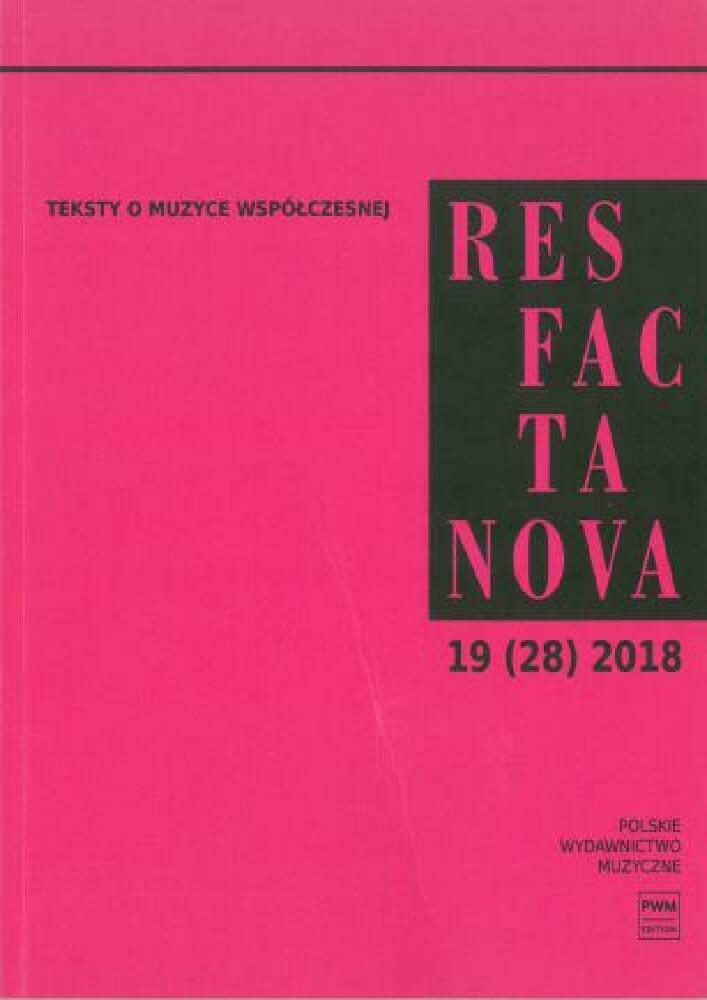Abstract
The presence of music in the contemporary world also encompasses its functioning within activities that can be termed “acoustic engineering”. It is a strategy that involves the designing, construction and modification of the acoustic space of a given place by means of programmed music using scientific and technical knowledge. Its purpose is to modify or change the recipients’ responses and behaviour in a way consistent with the values and interests of the sender. In such an approach, music is embedded in the framework of the social communication model, which assumes that the end result of the communication process is to control the recipients’ responses and behaviour (usually unconsciously for them). This strategy primarily concerns activities carried out in public space. The analysis of the selected concepts that use music as an instrument of “scientific management” in the workplaces and at the points of sale (e.g. Muzak and audiomarketing) seems to confirm that music was and is being used as an effective tool for the control and change of the workers or/and consumers behaviour. In this way, the listener is reduced to the role of a responsive recipient and becomes “the slave of the surrounding world”. The purpose of this article is to show the relationship between the “scientific management” doctrine introduced by Frederick Winslow Taylor in 1911 and the selected concepts in which music is treated as a tool of influence. Special attention will be paid to the contemporary activities known as audiomarketing, which, according to the Author, can be regarded as a manifestation of neo-Taylorism.
References
Bitner Mary Jo, Servicescapes: The Impact of Physical Surroundings on Customers and Employees, ,,Journal of Marketing” 1992 nr 56, s. 57–71.
Bradshaw Alan, McDonagh Pierre, Marshall David, Bradshaw Harry, “Exiled Music Herself, Pushed to the Edge of Existence”: The Experience of Musicians Who Perform Background Music, „Consumption Markets & Culture” 2005 vol. 8 nr 2, s. 219–239.
Ćwiklicki Marek, Współczesne oblicza tayloryzmu, [w:] Rozwój koncepcji i metod zarządzania, red. Janusz Czekaj, Marek Lisiński, Wydawnictwo Fundacji Uniwersytetu Ekonomicznego w Krakowie, Kraków 2011, s. 135–157.
DeNora Tia, Music in Everyday Life, Cambridge University Press, Cambridge 2000.
Erhardt Ludwik, Sztuka dźwięku, Wydawnictwa Artystyczne i Filmowe, Warszawa 1980.
Fulberg Paul, Using Sonic Branding in the Retail Environment – an Easy and Effective Way to Create Consumer Brand Loyalty while Enhancing the In-Store Experience, ,,Journal of Consumer Behaviour” 2003 nr 3, s. 193–198.
Jones Keith, Music in Factories: A Twentieth-Century Technique for Control of the Productive Self, „Social & Cultural Geography” 2005 vol. 6 nr 5, s. 723–744.
Jones Simon C., Schumacher Thomas G., Muzak: On Functional Music and Power, „Critical Studies in Mass Communication” 1992 nr 9, s. 156–169.
Kołodziej Jacek, hasło Socjotechnika, [w:] Słownik terminologii medialnej, red. Walery Pisarek, Universitas, Kraków 2006, s. 206.
Korczynski Marek, Pickering Michael, Robertson Emma, Rhythms of Labour: Music at Work in Britain, Cambridge University Press, New York 2013.
Kotler Philip, Atmospherics as a Marketing Tool, „Journal of Retailing” 1973–74 nr 49, s. 48–64.
Kotler Philip, Marketing. Analiza, planowanie, wdrażanie i kontrola, Wydawnictwo Felberg SJA, Warszawa 1999.
Lanza Joseph, Elevator Music. A Surreal History of Muzak, Easy-Listening and Other Moodsong, University of Michigan Press, Ann Arbor 2004.
Lutosławski Witold, O muzyce. Pisma i wypowiedzi, oprac. Zbigniew Skowron, słowo/obraz terytoria, Gdańsk 2011.
MacLeod Bruce, Facing the Muzak, „Popular Music and Society” 1979 nr 7, s. 18–31.
Makomaska Sylwia, Audiomarketing – problematyka badań, „Zeszyty Studia i Materiały Polskiego Stowarzyszenia Zarządzania Wiedzą” 2011 nr 50, s. 236–245.
Makomaska Sylwia, Droga do „makdonaldyzacji” doświadczenia słuchowego – refleksja nad obecnością muzyki tła w przestrzeni komercyjnej, [w:] Psychologia muzyki. Pomiędzy wykonawcą a odbiorcą, red. Julia Kaleńska-Rodzaj, Rafał Lawendowski, Harmonia, Gdańsk 2015, s. 151–162.
Makomaska Sylwia,“No wallpaper music” Movement in Poland – the Debate on the Presence of Background Music in the Public Space, [w:] Proceedings of the International Multidisciplinary Scientific Conference on Social Sciences and Arts SGEM 2015 Albena (Bulgaria) 26 August–01 September, Book 3 (Anthropology, Archaeology, History and Philosophy), Sofia 2015, s. 3–10.
Materiały firmowe Internet Media Services S.A.
Münsterberg Hugo, Psychology and Industrial Efficiency, Houghton Mifflin, Boston 1913.
Piotrowski Włodzimierz, Organizacje i zarządzanie – kierunki, koncepcje, punkty widzenia, [w:] Zarządzanie. Teoria i praktyka, red. nauk. Andrzej K. Koźmiński, Włodzimierz Piotrowski, Wydawnictwo Naukowe PWN, Warszawa 1998, s. 621–762.
Radano Ronald M., Interpreting Muzak: Speculations on Musical Experience in Everyday Life, ,,American Music” 1989 nr 7, s. 448–460.
Taylor Frederick W., Principles of Scientific Management, Harper&Brothers, New York–London 1911.
Duke Alan, http://edition.cnn.com/2009/SHOWBIZ/Music/02/11/muzak.bankruptcy/ (15.01.2017).
Opis kierunku inżynieria akustyczna prowadzonego na Akademii Górniczo-Hutniczej w Krakowie, http://msia.agh.edu.pl/?page_id=274 (3.04.2018).
http://inzynieriaakustyczna.pl/ (3.04.2018).
Anonim, http://media.hyperreal.org/zines/est/articles/muzak.html (15.01.2017).

